Top Rankings
South San Antonio Independent School District ranks among the top 20% of public school district in Texas for:
Category
Attribute
Community Size
Largest student body (number of students) (Top 1%)
For the 2025 school year, there are 8 public preschools serving 3,669 students in South San Antonio Independent School District. This district's average pre testing ranking is 1/10, which is in the bottom 50% of public pre schools in Texas.
Public Preschools in South San Antonio Independent School District have an average math proficiency score of 20% (versus the Texas public pre school average of 43%), and reading proficiency score of 32% (versus the 53% statewide average).
Minority enrollment is 96% of the student body (majority Hispanic), which is more than the Texas public preschool average of 76% (majority Hispanic).
Overview
This School District
This State (TX)
# Schools
13 Schools
4,192 Schools
# Students
6,840 Students
2,151,418 Students
# Teachers
439 Teachers
147,942 Teachers
Student : Teacher Ratio
16:1
16:1
District Rank
South San Antonio Independent School District, which is ranked #1143 of all 1,196 school districts in Texas (based off of combined math and reading proficiency testing data) for the 2021-2022 school year.
The school district's graduation rate of 76% has decreased from 87% over five school years.
Overall District Rank
#1148 out of 1204 school districts
(Bottom 50%)
(Bottom 50%)
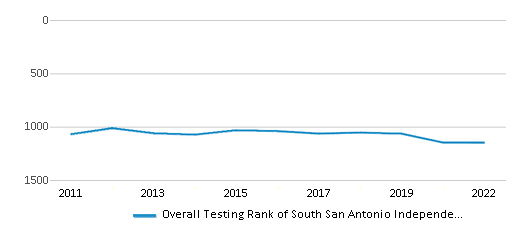
Math Test Scores (% Proficient)
18%
41%
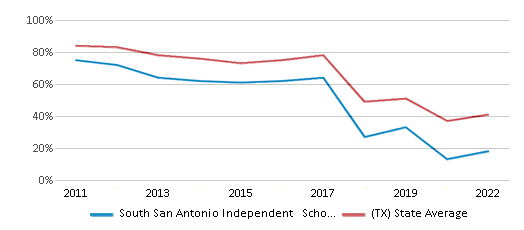
Reading/Language Arts Test Scores (% Proficient)
28%
51%
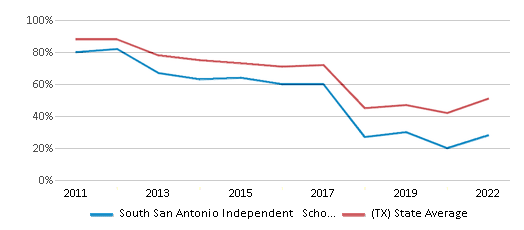
Science Test Scores (% Proficient)
25%
46%
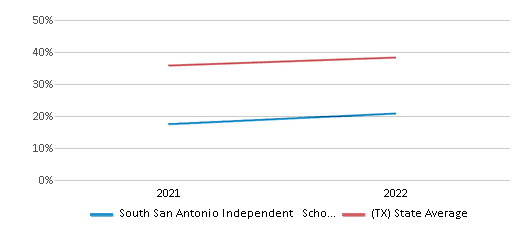
Graduation Rate
76%
90%
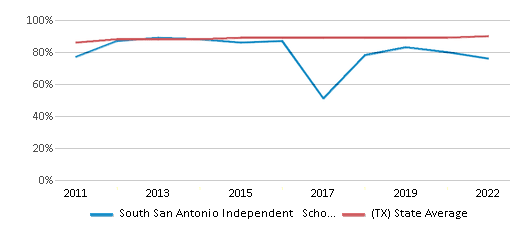
Students by Ethnicity:
Diversity Score
0.11
0.63
# American Indian Students
14 Students
6,302 Students
% American Indian Students
n/a
n/a
# Asian Students
13 Students
104,203 Students
% Asian Students
n/a
5%
# Hispanic Students
6,464 Students
1,180,208 Students
% Hispanic Students
95%
55%
# Black Students
77 Students
275,255 Students
% Black Students
1%
13%
# White Students
232 Students
509,082 Students
% White Students
3%
24%
# Hawaiian Students
12 Students
3,291 Students
% Hawaiian Students
n/a
n/a
# Two or more races Students
28 Students
73,077 Students
% of Two or more races Students
1%
3%
Students by Grade:
# Students in PK Grade:
495
275,832
# Students in K Grade:
498
307,607
# Students in 1st Grade:
546
310,480
# Students in 2nd Grade:
528
317,113
# Students in 3rd Grade:
508
300,451
# Students in 4th Grade:
528
295,281
# Students in 5th Grade:
566
258,890
# Students in 6th Grade:
501
33,806
# Students in 7th Grade:
464
14,241
# Students in 8th Grade:
540
12,959
# Students in 9th Grade:
506
7,002
# Students in 10th Grade:
484
6,366
# Students in 11th Grade:
346
5,781
# Students in 12th Grade:
330
5,609
# Ungraded Students:
-
-
District Revenue and Spending
The revenue/student of $16,240 is higher than the state median of $13,387. The school district revenue/student has grown by 20% over four school years.
The school district's spending/student of $15,544 is higher than the state median of $14,116. The school district spending/student has grown by 20% over four school years.
Total Revenue
$111 MM
$74,029 MM
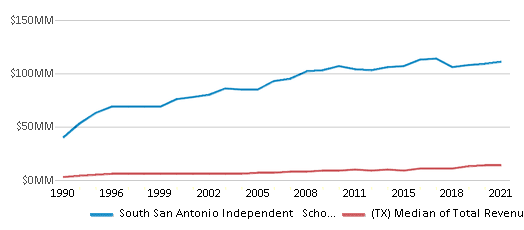
Spending
$106 MM
$78,063 MM
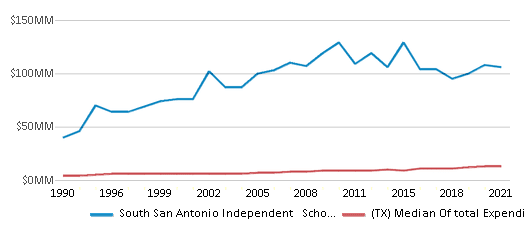
Revenue / Student
$16,240
$13,387
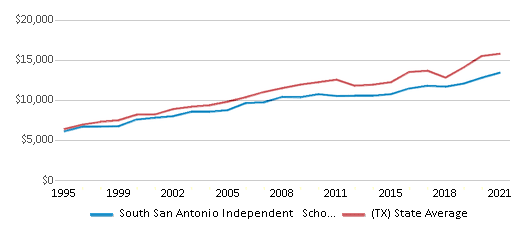
Spending / Student
$15,544
$14,116
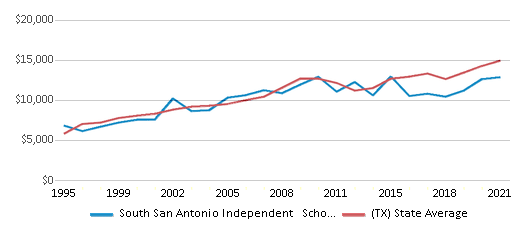
Best South San Antonio Independent School District Public Preschools (2025)
School
(Math and Reading Proficiency)
(Math and Reading Proficiency)
Location
Grades
Students
Rank: #11.
Price Elementary School
(Math: 25-29% | Reading: 30-34%)
Rank:
Rank:
2/
Bottom 50%10
245 Price Ave
San Antonio, TX 78224
(210) 977-7225
San Antonio, TX 78224
(210) 977-7225
Grades: PK-5
| 394 students
Rank: #22.
Palo Alto Elementary School
(Math: 20-24% | Reading: 35-39%)
Rank:
Rank:
2/
Bottom 50%10
1725 Palo Alto Rd
San Antonio, TX 78211
(210) 977-7125
San Antonio, TX 78211
(210) 977-7125
Grades: PK-5
| 531 students
Rank: #33.
Frank Madla Elementary School
(Math: 15-19% | Reading: 35-39%)
Rank:
Rank:
2/
Bottom 50%10
6100 Royalgate Dr
San Antonio, TX 78242
(210) 645-3800
San Antonio, TX 78242
(210) 645-3800
Grades: PK-5
| 392 students
Rank: #44.
Hutchins Elementary School
(Math: 20-24% | Reading: 30-34%)
Rank:
Rank:
2/
Bottom 50%10
1919 W Hutchins Pl
San Antonio, TX 78224
(210) 977-7200
San Antonio, TX 78224
(210) 977-7200
Grades: PK-5
| 433 students
Rank: #55.
Roy Benavidez Elementary School
(Math: 19% | Reading: 32%)
Rank:
Rank:
1/
Bottom 50%10
8340 So Ih 35
San Antonio, TX 78224
(210) 977-7175
San Antonio, TX 78224
(210) 977-7175
Grades: PK-5
| 662 students
Rank: #66.
Five Palms Elementary School
(Math: 18% | Reading: 27%)
Rank:
Rank:
1/
Bottom 50%10
7138 Five Palms Dr
San Antonio, TX 78242
(210) 645-3850
San Antonio, TX 78242
(210) 645-3850
Grades: PK-5
| 470 students
Rank: #77.
Neil Armstrong Elementary School
(Math: 15-19% | Reading: 25-29%)
Rank:
Rank:
1/
Bottom 50%10
7111 Apple Valley Dr
San Antonio, TX 78242
(210) 623-8787
San Antonio, TX 78242
(210) 623-8787
Grades: PK-5
| 325 students
Rank: #88.
Miguel Carrillo Jr Elementary School
(Math: 10-14% | Reading: 25-29%)
Rank:
Rank:
1/
Bottom 50%10
500 Price Ave
San Antonio, TX 78211
(210) 977-7550
San Antonio, TX 78211
(210) 977-7550
Grades: PK-5
| 462 students
Recent Articles

What Is A Charter School?
Explore the world of charter schools in this comprehensive guide. Learn about their history, how they operate, and the pros and cons of this educational innovation. Discover key facts about charter schools, including admission policies, demographics, and funding, as well as what to look for when considering a charter school for your child.

10 Reasons Why High School Sports Benefit Students
Discover the 10 compelling reasons why high school sports are beneficial for students. This comprehensive article explores how athletics enhance academic performance, foster personal growth, and develop crucial life skills. From improved fitness and time management to leadership development and community representation, learn why participating in high school sports can be a game-changer for students' overall success and well-being.

February 05, 2025
Understanding the U.S. Department of Education: Structure, Impact, and EvolutionWe explore how the Department of Education shapes American education, from its cabinet-level leadership to its impact on millions of students, written for general audiences seeking clarity on this vital institution.





